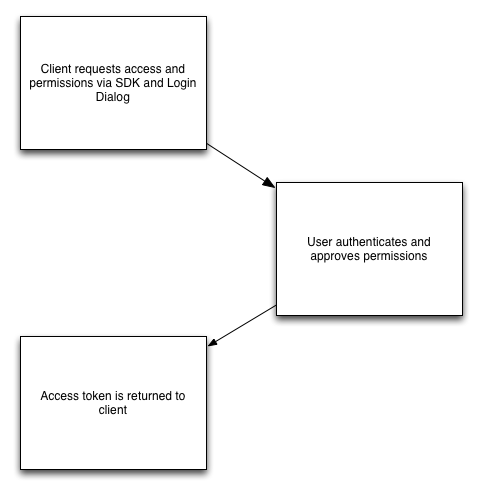Access Token
When someone connects with an app using Facebook Login, the app will be able to obtain an access token which provides temporary, secure access to Facebook APIs.
An access token is an opaque string that identifies a user, app, or Page and can be used by the app to make graph API calls.
The token includes information about when the token will expire and which app generated the token. Because of privacy checks, the majority of API calls on Facebook need to include an access token.
Although each platform generates access tokens through different APIs, all platforms follow the basic strategy to get a user token:

The users Access Token is represented by the AccessToken class.
Tokens are Portable
One important aspect to understand about access token is that they are portable. Once you have an access token you can use it to make calls from a mobile client, a web browser, or from your server to Facebook's servers. If a token is obtained on a client, you can ship that token down to your server and use it in server-to-server calls. If a token is obtained via a server call, you can also ship that token up to a client and then make the calls from the client.
Moving tokens between your client and server must be done securely over HTTPS to ensure the security of people's accounts. Read more about the implications of moving tokens between your clients and your server.
Access Token class
The AccessToken class represents a user's access token.
You will have access to this after a user is successfully logged in through the getAccessToken() function:
var token:AccessToken = FacebookLogin.instance.getAccessToken();
You will need the token String for any calls to the Facebook APIs.
Permissions
You can access the list of granted and denied permissions through the access token.
token.permissions: contains an array of permissions strings that this access token has been grantedtoken.declinedPermissions: contains an array of permissions strings that this access token has been denied
Access Token Changes
The access token can be updated over time, such as when the SDK refreshes a token with a longer expiration date. You can respond to changes in the access token by listening for the FacebookAccessTokenEvent.CHANGED event. This event will be dispatched whenever the access token changes and contains the new access token in the accessToken property.
FacebookLogin.instance.addEventListener( FacebookAccessTokenEvent.CHANGED, accessTokenChangedHandler );
function accessTokenChangedHandler( event:FacebookAccessTokenEvent ):void
{
// Update access token
trace( event.accessToken.token )
}